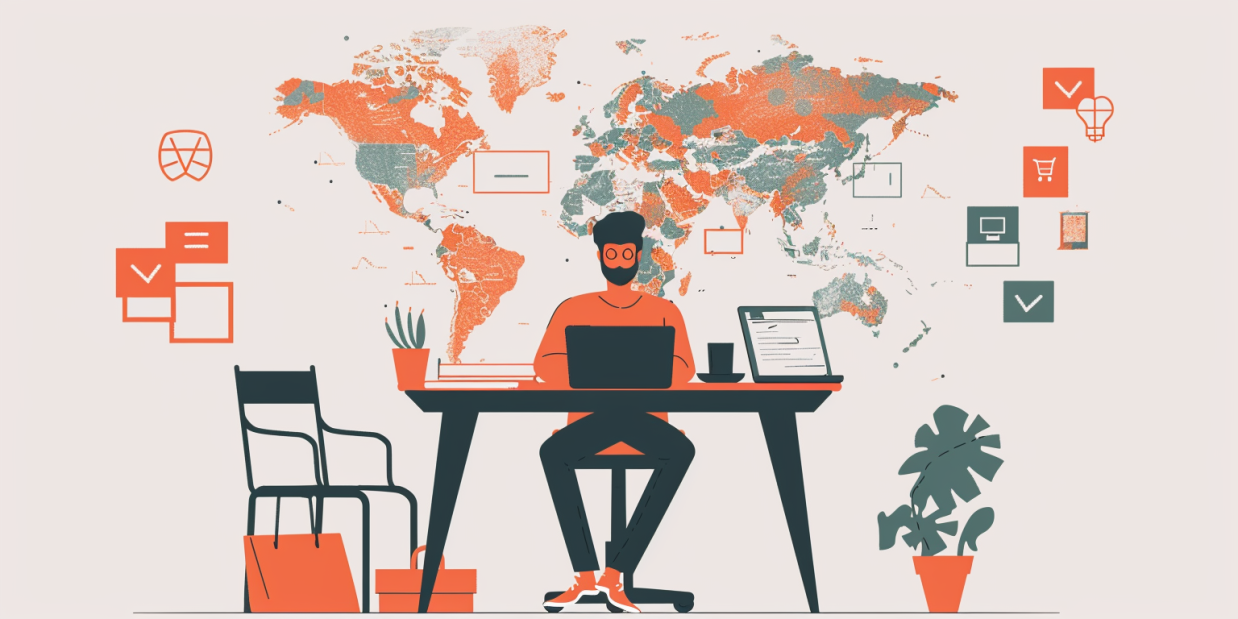AI, Remote Work, and the Global Job Market
Embrace AI's impact on remote work trends & the job market. Enhance communication, streamline projects, boost productivity. Adapt & thrive in the AI-driven remote work landscape with continuous learning & digital inclusion.
Get referred to your dream company
Sections
In an era where the boundaries of work are continually expanding, Technology-Aided Instruction (TAI) and Artificial Intelligence (AI) are playing pivotal roles in shaping the future of remote work and the global job market. As organizations and professionals adapt to the new normal of remote working, AI's influence is undeniably transforming how, where, and when we work. This blog post explores the impact of AI on remote work trends and its implications for the international job market.
The AI Revolution in Remote Work
The integration of AI into remote work has led to significant advancements in communication, project management, and productivity tools, making remote work more efficient and accessible. AI-powered platforms can now predict project timelines, automate routine tasks, and even ensure cybersecurity, fostering a remote work environment that is as dynamic and secure as the traditional office setting.
Enhancing Communication and Collaboration
AI-driven communication tools are breaking down geographical barriers, enabling real-time collaboration between global teams. With features like automated translation, voice recognition, and meeting summaries generated through natural language processing, AI is ensuring that language and distance no longer hinder productivity.
Streamlining Project Management
AI technologies are revolutionizing project management by automating scheduling, tracking progress, and even predicting potential delays using predictive analytics. These capabilities allow teams to stay on top of their projects and manage time effectively, regardless of their physical location.
Boosting Productivity and Work-Life Balance
AI is also instrumental in personalizing the remote work experience, with tools that can learn an individual's work habits and optimize schedules for maximum productivity and well-being. This not only enhances performance but also promotes a healthier work-life balance, a crucial aspect of remote work.
Impact on the Global Job Market
The rise of AI-driven remote work is reshaping the global job market in several key ways:
Expanding Opportunities Across Borders
Remote work, powered by AI, is opening up global job opportunities, enabling professionals to work for companies around the world without the need to relocate. This democratization of employment is particularly beneficial for regions with limited local job prospects, allowing for a more equitable distribution of work and talent.
Shifting Skill Demands
As AI takes over routine tasks, the demand is increasing for skills that AI cannot replicate, such as creative thinking, problem-solving, and emotional intelligence. This shift is prompting a reevaluation of education and training programs to focus more on these soft skills, alongside technical proficiency in AI and digital technologies.
Creating New Roles and Industries
Just as the internet era led to new professions, AI and remote work are generating new job categories and industries. Roles in AI development, remote work infrastructure, cybersecurity, and digital wellness are growing, reflecting the evolving needs of a remote workforce.
Challenging Traditional Employment Models
The rise of remote work is challenging traditional employment models, with freelancing and contract work becoming more prevalent. This shift towards a gig economy, facilitated by AI platforms that match freelancers with projects, offers flexibility for workers but also raises questions about job security and benefits.
Navigating the Future
To thrive in this AI-driven remote work landscape, both organizations and professionals need to adapt. Companies must invest in AI technologies and training, fostering a culture that supports remote work and continuous learning. For individuals, staying relevant means upskilling in digital and AI literacy, as well as developing the soft skills that AI cannot replicate.
Policy and Regulation
As remote work transcends national boundaries, there is a growing need for international policies and regulations that address issues such as labor rights, taxation, and data security in a remote work context. Ensuring fair and secure employment practices will be crucial as the global job market continues to evolve.
The Importance of Digital Inclusion
Finally, the shift to AI-driven remote work highlights the importance of digital inclusion. Ensuring access to reliable internet and digital technologies is fundamental in preventing a digital divide that could leave segments of the global workforce behind.
Conclusion
The integration of AI in remote work is not just changing where we work but also how we work, opening up new possibilities and challenges in the global job market. By enhancing efficiency, breaking down geographical barriers, and creating new job opportunities, AI is driving a significant transformation in the world of work. However, navigating this transition requires proactive adaptation from individuals, organizations, and policymakers alike. Embracing continuous learning, fostering digital inclusion, and developing policies for a global workforce are key to harnessing the benefits of AI and remote work for a more inclusive, dynamic, and resilient job market.
Your career is worth investing in.
Get unlimited referrals with Premium.
Community
© 2025 Crucible Fund LLC. All rights reserved.
